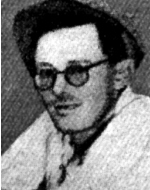Berlowitz, Yechezkel (Chatzi)
Son of Faiga and Nosson, was born on April 17, 1918 in Johannesburg, South Africa, the eldest son of a religious family with two daughters and six sons, who was educated in the spirit of tradition and continued his life throughout his life. In October 1944 he immigrated to Israel as one of the pioneers of the movement from South Africa and joined the Avraham group in Kfar Etzion, and he quickly adapted himself to Hebrew and work In the mountainous farm (in the preparation of land, forests and buildings) and was fond of the members In the gardens that were important to the agriculture as a resting place, he tried to acquire proficiency in the profession and found a way to succeed in it despite the lack of water for irrigation, and in July 1946 he volunteered to help the Arava household, Mizrachi “in South Africa before its center in Israel and demanded that more pioneers come in. He was one of the initiators of the establishment of the main hall in Neve Ovadia in memory of the late Rabbi Avraham Katz who fell in Hanita. When the group of immigrants from Hashomer Hadati arrived at the kibbutz in early 1947, they went to work in Ein Hanatziv, although it was difficult for them to part from their friends and plants in Kfar Etzion. He returned to Kfar Etzion to be close to Jerusalem, due to the need to visit various institutions and offices in order to prepare the documents for travel, and when the siege on Gush Etzion began, he decided to postpone his trip Until the land is quiet and even rejected Return to the eyes of the Netziv, despite the nuclear demands, until significant reinforcements for the defenders of the Gush. The reinforcements came, but immediately after that she was cut off from the battle in the battle near Nebi-Daniel, and since then he has not been able to leave. Yehezkel did his duty to the end in guarding, training and fortifications, and throughout the village life. It was clear to him the grave condition of the bloc, “the lonely island in the stormy Arab sea,” as he put it, but Gaza was his belief that no force could move the defenders from their positions. “There is no retreat from here after two Jewish settlements in this bloc were already destroyed.” He did not see the fall of the bloc, that during his service as liaison between the headquarters of the German monastery and the southern positions, he was hit by an enemy bullet and was found dead in a contact position near the ruined building of the carpentry shop on 3-15.4848. On the fifteenth day of Merhaven 5710 (17.11.1949), he was put to rest at the military cemetery on Mount Herzl in Jerusalem.
